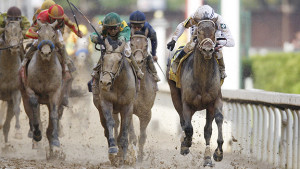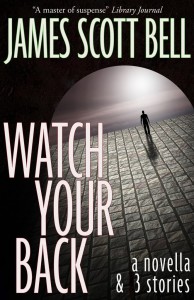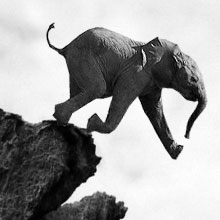James Scott Bell
Twitter.com/jamesscottbell
The future of the book industry got a little murkier this week. The Department of Justice, no less, thickened the soup with its announced intent to go after five of the “Big Six” publishers — plus Apple — on charges of collusion. The alleged nefariousness dates back to the wholesale versus agency controversy at Amazon.
Amazon was setting e-book prices lower than the big publishers desired. The pubs were afraid consumers would get used to lower prices, thus cutting into their margins. Also, there was major concern about undercutting a big cash cow for traditional publishing: hardcover frontlist titles. And, of course, they all worried about the future of brick-and-mortar stores as Amazon gobbled up more of the distribution pie.
So Steve Jobs comes along (allegedly) with a plan to take major e-book business away from Amazon. With the iPad just getting fired up, Jobs (allegedly) went to the Big Six and proposed going into an e-book agency model agreement with them (Random House didn’t join the circle then, so is not part of the DOJ lawsuit). In return, the publishers would agree to keep their books off Amazon if it sold them at a lower price. In effect the five big publishers, as one, told Amazon You give us the agency model or you don’t get our books.
The players, IOW, were jockeying for position with the future in mind. This is what big business does. It’s understandable and even desirable in a free market economy so long as the businesses are not running afoul of anti-trust laws.
Amazon, not happy with being forced into agency, decided to take on the publishing industry directly by mimicking it. So they went out and hired industry veteran Larry Kirshbaum to head up the effort. Amazon subsequently made some big name signings – Deepak Chopra and Barry Eisler, for example.
More jockeying.
And now comes a dark cloud dumping rain — the United States Gummint. The track is suddenly soaked and the mud is kicking up all over everybody.
Who is going to be the best mudder? Who is going to be left behind?
That remains to be seen. But right now it looks like agency pricing will be escorted off the track. If publishers are forced back into wholesale, Amazon will be sitting even prettier than it is now, prices will once again trend downward, and publishers’ margins will shrink. There will be renewed howls of “predatory pricing,” but the DOJ well knows that’s a much harder case to make. So Amazon goes back to selling at loss-leader prices which, in turn, will trickle down to brick-and-mortar stores where margins are razor thin anyway. More stores will probably close. Your local Barnes & Noble, for instance. There is a whole interlocking spiral here that is beyond the scope of this post.
My main interest is in what this all means for writers. For the last couple of years the self-publishing boom has been a net-gain for writers, especially those with a track record. And a backlist. But even new writers who haven’t been able to get inside the gates of the Forbidden City are seeing real money as independents.
But in gazing at the horizon in light of the DOJ’s action, some are saying that things don’t look so rosy. Here is what Mike Shatzkin, the Insightful One, has to say:
Over time, the biggest losers here will be the authors. The independent authors will feel the pain first. Agency pricing creates a zone of pricing they can occupy without much competition from branded merchandise. When the known authors are only available at $9.99 and up, the fledgling at $0.99-$2.99 looks very attractive and worth a try. Ending agency will have the “desired” effect of bringing all ebook prices down. As the big book prices are reduced, the ability of the unknowns to use price as a discovery tool will diminish as well. In the short run, it will be the independent authors who will pay the biggest price of all. But, in the long run, all authors will just get less. They will join the legion of suppliers beholden to a retailer whose mission is to deliver the lowest possible price to the consumer.
I am going to take issue with Mr. Shatzkin on his characterization of writers as the “biggest losers” in all this. Not so. This is simply another development in a long and ever changing contest. Writers who produce, consistently and well, will always have a shot at the rewards of a race well run.
We didn’t create the Big Six or Amazon. But we will use them just like they use us. We will make strategic decisions, as they do. It’s called doing business,and writers are better positioned than ever to do it in creative ways.
So get on your horse, writer. Learn to ride in the mud. Don’t trust your fate to anybody else. You are responsible for your future, and you need to grab the reins and get into the thick of it.
For example, if you pursue a traditional contract, take a hand in negotiations. Learn what contract terms mean. Negotiate a way to produce non-competing works on your own dime. Don’t just blindly hand the reins of your very life and career to somebody else. Ever again.
Have courage. There is a lot of bumping going on in the turns. Don’t be timid. Bump back. Hang tough in the saddle. If somebody tries to hit you with his riding crop, take it from him.
While the overall effect may be greater challenges vis-à-vis “discoverability,” so what? Facing and overcoming obstacles has always been the lot of the writer. Nothing’s different now. You must produce quality, and a lot of it, for the rest of your life to have a writing career. You must add a long tail to your horse. If you do, you have a chance to cross the finish line and get pelted with flowers.
And why, as a writer, wouldn’t you do this anyway? We write. Even if some of the big publishers fall off their horses, we writers will still be in the race. Even if bookstore shelf space continues to dry up, we writers will still be coming at you.
Because we are creating stories, which is what people want and need in this crazy world. We are weaving dreams, getting under your skin, keeping you up at night, making you laugh and cry and maybe sometimes throw our books across the room.
We are storytellers.
And we are not going away no matter how hard it rains.






